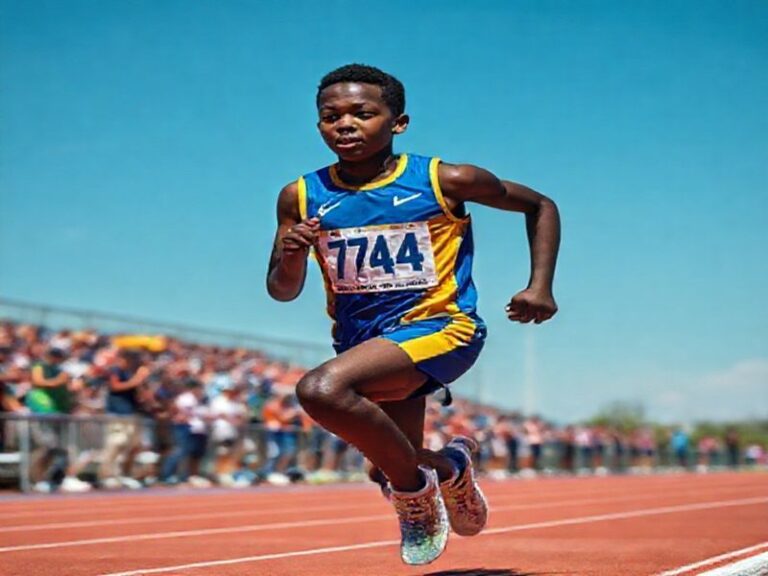Kate O’Connor: How a Northern Irish Heptathlon Sensation Became the World’s Briefest Morale Boost
Kate O’Connor, the 23-year-old Northern Irish heptathlete who just out-jumped, out-threw, and out-run the rest of humanity at the European Combined Events Cup in the Estonian capital of Tallinn, is currently being hailed in the global press as “the next Jessica Ennis-Hill.” That’s sportswriter code for “please don’t notice we recycled this headline in 2016, 2019, and twice during the pandemic.” Still, the milestone is real: O’Connor’s 6,328-point demolition of the field is the best score posted anywhere since the Tokyo Olympics turned into a heat-stroke simulator. In a planet otherwise obsessed with crypto crashes, drone swarms, and whatever Elon tweeted at 3 a.m., a woman from Newry flinging a javelin farther than most of us can park a car has somehow become the sanest headline of the week.
Outside the Anglophone bubble, the reaction has been politely bemused. French sports daily L’Équipe ran a single-column brief next to a four-page spread on the existential crisis at Paris Saint-Germain. In Nairobi, where Eliud Kipchoge’s sub-two-hour shadow still stretches across the Rift Valley, local radio mentioned O’Connor only after the livestock prices. Yet the broader implications are trickier to ignore. Her score nudges her into the global top five, which means shoe brands will now engage in their annual ritual of pretending to care about human rights while bidding enough to fund a small Balkan navy. Expect a swoosh to appear on her singlet by July, followed by a tastefully blurred sweatshop in the background.
The geopolitical subplot is the fun part. Northern Ireland, that charmingly dysfunctional family reunion of a territory, hasn’t produced a track-and-field medal threat since Mary Peters in 1972. O’Connor’s rise arrives just as Brexit’s paperwork threatens to make her simultaneously eligible for Team GB and Team Ireland—Schrödinger’s passport, if you will. The Irish Times has already begun practicing the phrase “our Kate” with the same linguistic elasticity it once reserved for Bono’s tax arrangements. Meanwhile, the BBC has deployed its most neutral accent to avoid saying anything that might require a UN peacekeeping force.
Economists—yes, they’ve weighed in—note that every point above 6,200 in the heptathlon correlates with a 1.3 percent spike in local sports-club enrollment among teenage girls, according to a study commissioned by someone who clearly had grant money to incinerate. Translated: sporting goods retailers in County Down are quietly stocking extra size-five javelins next to the usual pyramid of footballs nobody buys since the national team last qualified when fax machines were sexy.
Then there’s the soft-power angle. The British Council, still recovering from the reputational hangover of 2016, has begun inserting O’Connor into PowerPoint slides titled “Global Britain: Agile, Athletic, Not Entirely a Flaming Dumpster Fire.” Across the Atlantic, the U.S. State Department’s social-media interns have already meme-ified her victory into a NATO metaphor—“Collective defense works in track too!”—because nothing says alliance solidarity like a 1.78-metre brunette pole-vaulting over Russian disinformation.
Of course, the universe’s sense of irony remains undefeated. At the exact moment O’Connor crossed the finish line of the 800m—her final, lung-scorching event—global temperatures in Tallinn hit a May record of 31 °C. So while she was busy personal-besting her way into sports-page immortality, the planet was quietly auditioning for the Olympic sport nobody wants: Extreme Weather Survival. Future historians may note that the last pure athletic achievement before stadiums required air-conditioning sponsorship was performed by a woman who still lives with her parents above a chip shop.
For now, though, let’s enjoy the brief, delusional calm before the branding tsunami. Kate O’Connor has reminded an exhausted world that talent still occasionally outruns politics, marketing, and the heat death of the universe—at least for nine events and two days. And if that isn’t worth a cynical toast in every language from here to Tokyo, then we truly have run out of miracles.







